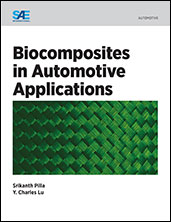Book

Composites in Automotive Applications set
2015-09-10
This set consists of three books, Design of Automotive Composites, CAE Design and Failure Analysis of Automotive Composites, and Biocomposites in Automotive Applications all developed by Dr. Charles Lu and Dr. Srikanth Pilla. Design of Automotive Composites reports successful designs of automotive composites occurred recently in this arena, CAE Design and Failure Analysis of Automotive Composites focuses on the latest use of CAE (Computer-Aided Engineering) methods in design and failure analysis of composite materials and structures, and Biocomposites in Automotive Applications, focuses on processing and characterization of biocomposites, their application in the automotive industry and new perspectives on automotive sustainability. Together, they are a focused collection providing the reader with must-read technical papers, hand-picked by the editors, supporting the growing importance of the use of composites in the ground vehicle industry. Dr. Charles Lu is H.E.

